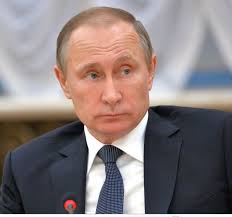
By John Helmer, Website, 6/24/23
In brief statements issued late last week in Moscow – their significance missed in the western press — President Vladimir Putin ordered a reality check of Russia’s war strategy. He then answered himself by declaring the war will be over when no Ukrainian army will be left on the battlefield, nor NATO weapons.
The Foreign Ministry answered by pointing out that Russia does not recognize there is a legal Ukrainian state because the reality is that the mutual recognition treaty between Russia and the Ukraine was cancelled by Presidents Petro Poroshenko and Vladimir Zelensky in 2018 and 2019 [3].
“We can conclude,” Putin said [4] at the Security Council meeting on Thursday morning, “that they can certainly send in additional equipment, but the mobilisation reserve is not unlimited. And Ukraine’s Western allies really seem determined to fight with Russia to the last Ukrainian. At the same time, we must proceed from the fact that the enemy’s offensive potential has not been exhausted; they may have strategic reserves yet unused, and I ask you to keep this in mind when making fighting strategies. You need to proceed from reality.”
Putin was following by a few hours the statement by the Foreign Ministry that Russia does not recognize the legal sovereignty of the regime in Kiev, and that following the cancellation of the treaty between the Ukraine and Russia in 2019, there will be no Ukrainian state left to sign an end-of-war agreement.
At her weekly briefing of reporters, the ministry spokesman Maria Zakharova, was asked “when will Russia initiate a legal procedure to terminate the bilateral treaty with Ukraine on its sovereignty?” Zakharova answered: “The procedure for terminating the bilateral treaty with Ukraine on its sovereignty is hampered by the absence of such a treaty. In Article 1 of the Treaty on the Principles of Relations between the RSFSR and the Ukrainian SSR of November 19, 1990, the two republics recognised each other as ‘sovereign states.’ The 1990 treaty was then replaced by the Treaty on Friendship, Cooperation, and Partnership between the Russian Federation and Ukraine of May 31 [5], 1997 (Article 39), which was denounced [6] by Ukraine and terminated on April 1, 2019.”
No army, no state. But the war will continue because it is the one between the US and the NATO powers and Russia. That too will have an ending, but longer.
“If [NATO Secretary-General] Mr Stoltenberg again says on behalf of NATO that they are against freezing the conflict in Ukraine,” Foreign Minister Sergei Lavrov said on June 21 [7], “this means that they want to fight. So let them fight. We are ready for that. We realised NATO’s true goals in Ukraine some time ago as their plans took shape over the years that followed the coup. Today, NATO is attempting to implement them…they are directly involved in the hybrid and hot war declared on Russia.”
I am reminded, Lavrov added, “of a Soviet-era joke noting that the Soviet Union is located too close to US military bases.” The Soviet Union was dismantled, but the war continues against Russia. It will end when the US is pushed to a safe distance. How safe, Putin asked Defense Minister Sergei Shoigu to explain in answer to two questions?
Putin’s question: “we know that the enemy is to receive additional Western equipment. What does the Defence Ministry think about threats in this connection?”
Shoigu’s answer: “All arsenals, accumulated by the Soviet Union and countries of the former socialist bloc, have now been virtually depleted. We can say the same about former Ukrainian resources… the amount, due to be delivered throughout 2023, as well as those weapons that have already been delivered, will not seriously affect the course of hostilities. Additionally, most of the armoured vehicles and fighting vehicles belong to the previous generation, or even to an earlier generation. On the one hand, their armour is weak and ineffective, compared to modern equipment. Mr President, we do not see any threats here.”
Question: “Mr Shoigu, what is the percentage of Western equipment out of the equipment that has been destroyed since June 4, which Mr Patrushev has just reported giving generalised data? Approximately.”
Answer: “Of the 246 tanks destroyed, 13 were Western made. At the same time, it should be noted that, if we consider the equipment that was delivered, tanks in particular: 81 Western-made tanks have been delivered. Of the 81 Western tanks, 13 [16%] have been destroyed. Of the armoured fighting vehicles, 59 Western ones have been destroyed. To date, Western countries have supplied Ukraine with an estimated 109 Bradley armoured fighting vehicles. Of the 109 BFVs, 18 [17%] have been destroyed. Overall, 59 Western-made armoured vehicles have been destroyed. As for field artillery and guns, here, of course, I can estimate right away that out of the 48 pieces destroyed, about 30 percent were Western made.”
The “reality”, Putin concluded publicly, not for Shoigu or the General Staff, is that the percentage of NATO weapons destroyed on the battlefield will rise sharply because “the enemy’s offensive potential has not been exhausted; they may have strategic reserves yet unused.” When those reserves are defeated, there will be neither NATO arms nor Ukrainian men left.
The significance of this re-tuning of Russia’s war aims was diverted for several hours by the Prigozhin affair [8].
The return of the Wagner columns to their bases in Lugansk, the dissolution of Wagner by the Defense Ministry, and the exit of Prigozhin to house arrest in Belarus remove the distraction from the battlefield and the General Staff’s war strategy. If Prigozhin cannot bear the silence, the lack of access to the fortune he has accumulated, and his loss of freedom of movement, he may attempt a break-out to Africa, to plot his return to Russian politics. He will also be aware of the Lebed precedent – and the danger of taking helicopter rides [9].
Russian military sources believe the outcome of the one-armed rebellion will be salutary for the key decision-makers including Putin and Shoigu; least of all the General Staff and the chief, General Valery Gerasimov, who have come out of the affair with greater political leverage over the Kremlin. According to one Moscow source, “Now that the General Staff have saved the president, the latter will allow General Patience to continue doing its work, as Generals Iskander and Kinzhal seem to be doing theirs now.”

President Putin in a visit to the headquarters of the Dnieper battlegroup near the Kherson front on April 18. Tass reported [11]: “While at the headquarters of the Dnepr battlegroup near the Kherson front, Vladimir Putin heard reports delivered by Airborne Troops commander Colonel General Mikhail Teplinsky [left], Dnepr battlegroup commander Colonel General Oleg Makarevich [right] and other field commanders.”
The last comment is a reference to long-range missile strikes against Ukrainian command headquarters, airfields, reserve stocks of ammunition and fuel, and NATO storages. After Shoigu had publicly warned on June 20 [12] of decapitation strikes if the Ukrainians attacked targets in the Crimea and other Russian regions, and there was a Storm Shadow attack on the Chongar bridge in the Crimea on June 22, the Defense Ministry reported that it had launched a June 23 [13] salvo “ in response to a strike on a road bridge across the Chongar Strait [as well as] , a warehouse with Storm Shadow cruise missiles was destroyed at a Ukrainian airbase near the settlement of Starokonstantinov in the Khmelnitsky region.”

Left: Missile explodes on impacting the Chongarsky bridge on June 22; right, impact crater on the bridge road surface. Source: https://www.dailymail.co.uk [15]
As for the impact of the affair on the conduct of the war, the assessment reported in the broadcast several hours before the end of the affair, was between next to nothing and not very much. The no Ukrainian army, no NATO weapons, no Kiev state goals are much more important now.
A NATO veteran comments on what he expects to see next at the front. “The Ukrainians are going to have a problem disengaging at the front lines and passing on to a conventional defence. I’ve noticed that the Russians, especially on the Lugansk People’s Repubic/Kharkov front, have massed significant forces and are applying pressure. This is causing the Ukrainians to shift and commit forces to the area either to stop the Russians, or to gain the initiative via attack. Unless they are willing to accept losing territory in favour of sparing their reserves — which they don’t seem to be — they will continue to be ground down at the front. While this is going on, their logistics will disintegrate at an increasing scope and rate due to Russian strikes, made up in large part of cheap Iranian-designed drones augmented by missiles.
“Stavka is moving away from the battalion tactical group as the fulcrum of operations and back to division-level formations. The forces built up on the Kharkov front are indicative of that. When your enemy knows how you think on a fundamental level, it’s a trifle for them to figure out what you’ll do next. After that, it’s about how to maneuver the enemy into doing it when and where they choose. I’m going to keep watching Kharkov.”
Listen to the presentation in the third segment of TNT Radio’s War of the Worlds, from Minute 46 [16]:

Source: https://tntradiolive.podbean.com/ [16]
Article printed from Dances With Bears: https://johnhelmer.net
URL to article: https://johnhelmer.net/putin-orders-reality-check-no-ukrainians-left-on-the-battlefield-no-sovereignty-in-kiev/
URLs in this post:
[1] Image: https://johnhelmer.net/wp-content/webpc-passthru.php?src=https://johnhelmer.net/wp-content/uploads/2023/06/2872.png&nocache=1
[2] @bears_with: https://twitter.com/bears_with
[3] 2018 and 2019: http://opiniojuris.org/2019/05/01/termination-of-the-treaty-of-friendship-between-ukraine-and-russia-too-little-too-late-%EF%BB%BF/
[4] said: http://en.kremlin.ru/events/president/news/71482
[5] May 31: https://docs.cntd.ru/document/1902220
[6] denounced: https://mid.ru/en/press_service/spokesman/briefings/1890329/
[7] June 21: https://mid.ru/en/foreign_policy/news/1889753/
[8] Prigozhin affair: https://johnhelmer.net/from-pugachev-to-lebed-the-muzhik-rebellion-fizzles-out-without-bloodshed-prigozhin-to-africa/
[9] helicopter rides: https://www.irishtimes.com/news/death-of-lebed-in-crash-may-have-been-sabotage-1.1086774
[10] Image: https://johnhelmer.net/wp-content/webpc-passthru.php?src=https://johnhelmer.net/wp-content/uploads/2023/06/President-Putin-in-a-visit-to-the-headquarters-of-the-Dnieper-battlegrou.png&nocache=1
[11] reported: https://tass.com/politics/1605705
[12] June 20: https://twitter.com/bears_with/status/1671415275151826946?cxt=HHwWhICxucrVh7IuAAAA
[13] June 23: https://t.me/mod_russia/27812
[14] Image: https://johnhelmer.net/wp-content/webpc-passthru.php?src=https://johnhelmer.net/wp-content/uploads/2023/06/chongar-attack.png&nocache=1
[15] https://www.dailymail.co.uk: https://www.dailymail.co.uk/news/article-12221845/British-Storm-Shadow-missile-hits-bridge-Crimea-Russian-territory.html
[16] from Minute 46: https://tntradiolive.podbean.com/e/war-of-the-worlds-24-june-2023/
[17] Image: https://johnhelmer.net/wp-content/webpc-passthru.php?src=https://johnhelmer.net/wp-content/uploads/2023/06/wows-june-24.png&nocache=1


